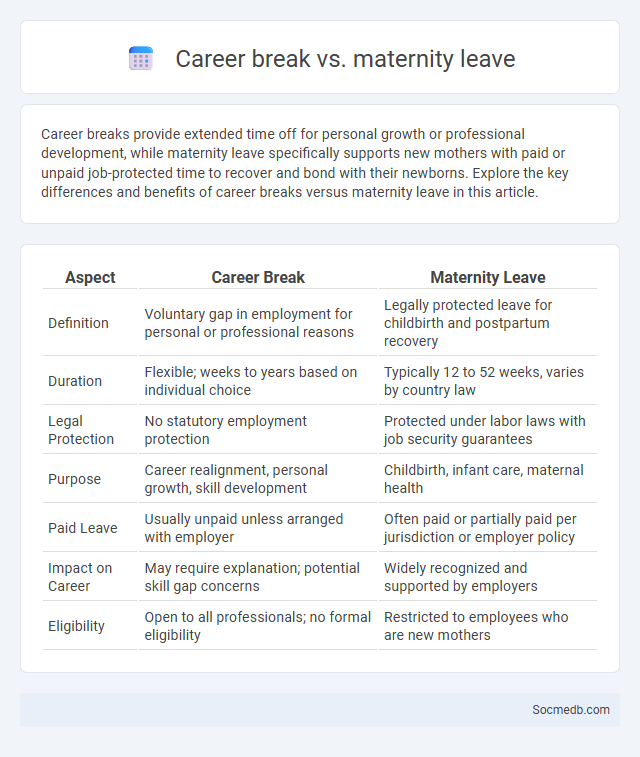
Photo illustration: Career break vs Maternity leave
Career breaks provide extended time off for personal growth or professional development, while maternity leave specifically supports new mothers with paid or unpaid job-protected time to recover and bond with their newborns. Explore the key differences and benefits of career breaks versus maternity leave in this article.
Table of Comparison
| Aspect | Career Break | Maternity Leave |
|---|---|---|
| Definition | Voluntary gap in employment for personal or professional reasons | Legally protected leave for childbirth and postpartum recovery |
| Duration | Flexible; weeks to years based on individual choice | Typically 12 to 52 weeks, varies by country law |
| Legal Protection | No statutory employment protection | Protected under labor laws with job security guarantees |
| Purpose | Career realignment, personal growth, skill development | Childbirth, infant care, maternal health |
| Paid Leave | Usually unpaid unless arranged with employer | Often paid or partially paid per jurisdiction or employer policy |
| Impact on Career | May require explanation; potential skill gap concerns | Widely recognized and supported by employers |
| Eligibility | Open to all professionals; no formal eligibility | Restricted to employees who are new mothers |
Understanding Career Breaks: Definition and Purposes
Career breaks refer to planned periods away from professional work, often lasting from several months to a few years, used for personal development, education, travel, or caregiving. Social media platforms play a crucial role in shaping perceptions by providing professionals opportunities to share experiences, reflect on growth, and network during or after these breaks. Understanding the strategic purposes behind career breaks helps employers and job seekers appreciate the diverse skills and perspectives gained during these intervals.
What Is Maternity Leave? An Overview
Maternity leave is a legally mandated period of paid or unpaid time off granted to mothers before and after childbirth, enabling recovery and infant care. The duration and benefits of maternity leave vary widely across countries, often influenced by labor laws, social policies, and employer practices. Access to maternity leave supports maternal health, promotes child development, and contributes to workplace gender equality.
Key Differences: Career Break vs. Maternity Leave
Career breaks often involve a voluntary pause for personal growth, travel, or skill development, while maternity leave specifically addresses time off for childbirth and postpartum recovery. Social media posts about career breaks emphasize flexibility, self-improvement, and exploring new opportunities, whereas maternity leave content highlights health, family bonding, and legal rights. Understanding these key differences can help you tailor your social media strategy to resonate with your audience's unique life events and professional needs.
Legal Rights and Policies: Navigating Leave Options
Employees navigating leave options must understand their legal rights under laws such as the Family and Medical Leave Act (FMLA) and the Americans with Disabilities Act (ADA), which protect job security during qualifying absences. Social media policies are critical, as misuse can lead to disciplinary action or affect eligibility for leave, emphasizing the need for clear employer guidelines. Awareness of these regulations helps both employers and employees manage leave requests while maintaining compliance with labor laws and protecting workplace integrity.
Eligibility Criteria for Career Breaks and Maternity Leave
Social media platforms increasingly require employees to meet specific eligibility criteria for career breaks and maternity leave, often including minimum tenure and documented work performance. Your eligibility may depend on company policy aligned with labor laws that protect parental rights and job security during extended leave periods. Understanding these criteria ensures you can plan your career breaks or maternity leave without jeopardizing your social media career advancement.
Financial Implications of Each Leave Type
Understanding the financial implications of each leave type is essential for effective budgeting and personal financial planning. Paid leave such as sick leave, vacation, and parental leave generally provides income replacement, while unpaid leave can lead to significant income loss, impacting Your financial stability. Evaluating the policies of your employer and local regulations helps you make informed decisions about time off and manage potential financial risks.
Impact on Career Progression and Job Security
Social media platforms significantly influence career progression by showcasing Your skills, achievements, and professional network, increasing visibility to potential employers and collaborators. Negative or inappropriate content can jeopardize job security by damaging Your reputation and trustworthiness in the workplace. Strategic management of Your online presence enhances career opportunities and safeguards employment stability in an increasingly digital job market.
Benefits and Drawbacks: Career Breaks vs. Maternity Leave
Social media offers valuable support networks and professional visibility during career breaks and maternity leave, helping you maintain connections and showcase skills. However, excessive use can blur boundaries between personal and professional life, potentially impacting mental health and career focus. Balancing engagement ensures you benefit from online opportunities while protecting your well-being.
Planning Your Return to Work: Strategies and Tips
Effective planning your return to work involves creating a structured schedule that balances social media use with professional responsibilities to maintain productivity. Prioritizing tasks and setting clear boundaries for social media engagement helps reduce distractions and enhances focus during work hours. Utilizing tools like content calendars and app blockers supports a smooth transition back to your professional routine while managing your online presence strategically.
Which Option Is Right for You? Factors to Consider
Choosing the right social media platform depends on your target audience, content type, and business goals. Consider factors such as platform demographics, user engagement rates, advertising capabilities, and content format compatibility. Evaluating these elements helps optimize reach, improve brand visibility, and maximize return on investment for marketing campaigns.
 socmedb.com
socmedb.com